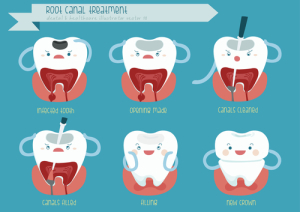 Pain and swelling in the mouth are always a reason to call the dentist.
Pain and swelling in the mouth are always a reason to call the dentist.
If you have a tooth that was treated with root canal therapy, the tooth’s soft inner pulp, which included the nerve and blood vessels, was replaced with a manmade material. The treated tooth is no longer alive, but it is intact, so you did not have to undergo an extraction and replacement. In some cases, root canal treatment lasts a lifetime. A small percentage of root canals fail, however. In these scenarios, the affected tooth will require retreatment, apectomy (microsurgical removal the root tip), or extraction and replacement.
If you experience pain and/or swelling around a tooth that was treated with root canal therapy, call Docklands Dental Studio immediately, and we’ll find a way to make you comfortable, assess the situation, and then make a recommendation for treatment.
Why Root Canals Fail
Three primary causes contribute to root canal treatment failure. Either the tooth was not properly cleaned prior to filling the canal, an infected crack exists, or the seal between the restoration and tooth was violated so that bacterial infiltrated the tooth’s canal once again. In some cases, the initial treatment is the cause of the problem; other times, re-infection occurs long after the initial treatment.
Before you blame your dentist, know that teeth roots are intricate and varied. Every tooth in every patient’s mouth is different. That’s why dental records are as effective as fingerprints for identification. While the crowns of your teeth (the white part you see) are unique, so are the roots. A tooth’s root may have multiple, tiny canals or branched canals that are not all visible on an x-ray.
Another issue is cracks. An infected canal can be treated, but an unidentified, miniscule crack in a tooth may harbor bacteria. The crack may be present, but not visible, before root canal therapy, or it may develop long after treatment is complete.
When the seal between natural tooth structure and a restorative dental crown fails, bacteria can infiltrate the tooth. This situation is called coronal leakage, and it will cause root canal failure.
Of course, a root canal can fail if the affected tooth encounters other issues, such as gum disease, a fracture, or tooth decay.
Retreatment Options
Failed root canals must be addressed by a dentist. There is nothing the patient can do, no medicine he can take, to repair the damage. Without treatment, the bacteria, pressure, and pain will increase. Ultimately, infection can spread and the tooth can fall out. Overall health can be negatively affected if oral infection enters the blood stream and travels to other parts of the body.
After assessing your tooth, the Docklands Dental Studio team may suggest retreatment. For this procedure, the restoration is removed and then the tooth undergoes root canal treatment again. The tooth may need to be built up with a post and core, for optimal stability. In many cases, retreatment is effective.
Call Today for Help
If your root canal fails, or you have a toothache on a tooth that has undergone root canal therapy, call Docklands Dental Studio today for an appointment. We’ll see you as soon as possible. New patients are welcome. Call (03) 9021 9487.
